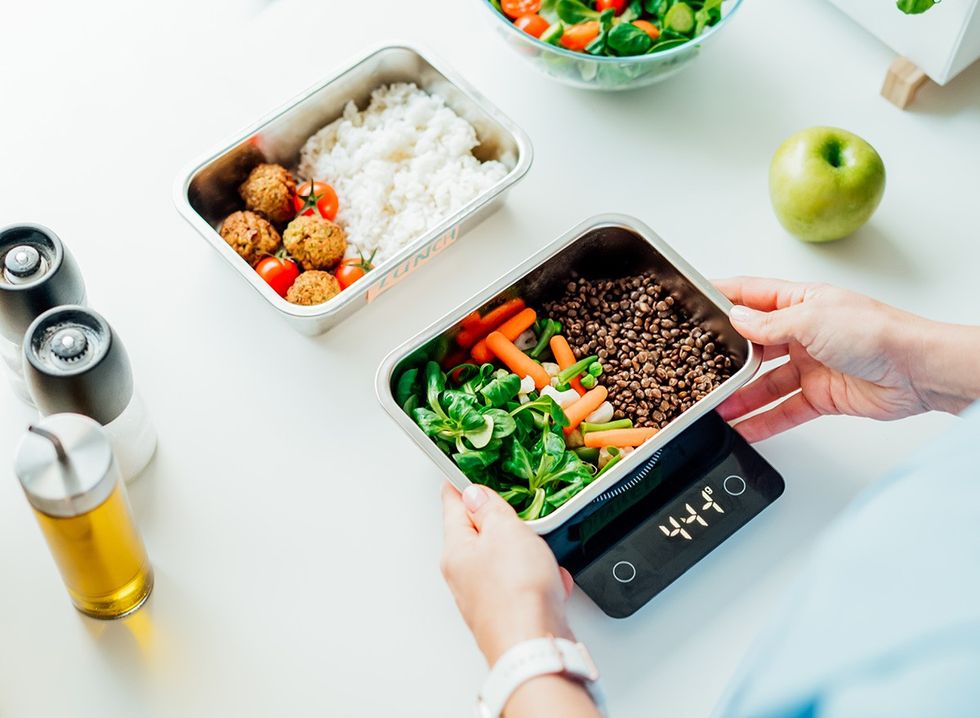Are you unsure about how long you should be working out to lose weight? One expert has the answer. McKenna Olsen is an influencer and health coach who recently lost 10 pounds. In a new social media post, she answers the burning question: “How long should you be working out for best results?” she asks, continuing to reveal the answer.
It Depends, She Says
How long should you work out? “I know you won’t like this answer but.... it DEPENDS and quality over quantity ultimately is what matters,” she says.
RELATED: 15 Quick Ways to Lose Body Fat Percentage in a Week
Ask Yourself the Following Questions
She suggests questions to ask before determining time or frequency:
- “Where are you starting from?
- What is realistic for your life?
- What is your lifestyle like?
What are your specific goals? (Do you want to lose body fat? Compete? Obviously frequency will differ in those scenarios.)”
Fcus on Quality Over Quantity
Overall, you should focus on quality over quantity. “Obviously lotttts to consider here, but one thing I’ll say is it’s easy to get caught up in HOW MUCH you should be working out when really, QUALITY is what matters MOST,” she says.
Focus on Efficiency
“How long you workout doesn’t matter as you can make a 45 min workout just as efficient as 2 hours, if you focus and have intention going into it. You can go to the gym for 2 hours a day or do 2 a day everyday, but not have intention when you go. You can go to the gym 3-4 days a week, with intention, focusing on progressing, and being more focused than the person who goes 2 hours a day and still makes great progress,” she says.
Strength Train 3 Days a Week
“If your goal is to gain muscle and lose fat, aiming for strength training at least 3 days a week is going to be the best route to get you there. Of course, working out with a plan and intention instead of going through the motions, matters, too. Quality over quantity always,” she concludes.
Is Meal Frequency Important
In another post, she answers another question: “Does meal frequency matter for fat loss?” she writes. According to McKenna, meal frequency isn’t important. “Simply put: There is no magic frequency or timing of meals,” she says in her post. “The old belief that 6 meals a day, 2 hours apart, was best for metabolism and losing fat is dead. Your body simply knows caloric intake.”
RELATED: 10-Min Walking Workout Burns Fat at Home, Says Coach
Eating at Least 3 Meals a Day Will Help You Feel Your Best
However, there are a few things that come into play. “I will say that for sustained energy and better digestion, eating at least three main meals is going to likely make you feel your best and allow you to get in all the nutrients your body actually needs,” she says.
Protein Should Also Be Dispersed
Protein also plays a huge role. “Also, science shows dispersing protein intake does make a difference in recovery AND muscle growth/repair,” she says.
Only Eating One Meal a Day Isn’t Good for Fat Loss, She Says
OMAD (one meal a day) isn’t good for fat loss, she claims. “It’s going to be really tough to get in the protein, carbs, fat, and fiber your body needs by eating 1x a day, and you likely are going to feel run down, tired, low energy, and potentially lack proper digestion. Not only that, but you will notice a difference in regulated blood sugar and hormonal fluctuations, directly affecting everything I listed above,” she explains.
It Is Also Not Good for Hormones
It can also have a hormonal impact. “As women especially, fueling yourself ENOUGH for hormonal health is so important. Again, it’s hard to get the calories you need in ONE feeding,” she says.
RELATED: 12-3-30 Walking Method: 20 Proven Tips to Lose Weight Faster
Frequency Is “Personal Dependent”
“At the end of the day, frequency is personal dependent,” she maintains, suggesting a few questions to ask yourself when figuring out proper meal frequency/timing for your life:
- How many meals is realistic for my schedule? (Do you have more time to eat or less?)
- Do I notice I feel better energy-wise, eating smaller, more frequent meals or larger, less frequent meals?
- Do I notice a difference in satisfaction with bigger or smaller meals?
She Sticks to 3 Meals and 2 Snacks
“I used to eat six meals a day, but now I am more of a three with two snacks type-a-gal,” she says. “It’s realistic for me, and I feel so much more satisfied with bigger meals vs. a small meal every 2 hours.”

















 Shutterstock
Shutterstock Shutterstock
Shutterstock Lean Turkey Taco Lettuce WrapsShutterstock
Lean Turkey Taco Lettuce WrapsShutterstock Garlic Butter Shrimp & Sweet PotatoesShutterstock
Garlic Butter Shrimp & Sweet PotatoesShutterstock 20 Ways to Lose Body Fat Really Fast From Top Nutritionist
20 Ways to Lose Body Fat Really Fast From Top Nutritionist

 I'm a Nutritionist and These 9 High-Protein Snacks Keep My Clients Full While Losing 50 Pounds
I'm a Nutritionist and These 9 High-Protein Snacks Keep My Clients Full While Losing 50 Pounds
 Shutterstock
Shutterstock 2. Processed FoodsShutterstock
2. Processed FoodsShutterstock Shutterstock
Shutterstock Shutterstock/Prostock-studio
Shutterstock/Prostock-studio Shutterstock
Shutterstock Pro TipsShutterstock
Pro TipsShutterstock Shutterstock
Shutterstock Shutterstock
Shutterstock Shutterstock
Shutterstock Shutterstock
Shutterstock Don’t Drink as Much AlcoholShutterstock
Don’t Drink as Much AlcoholShutterstock Most Women on GLP-1s Are Making a Few Common MistakesShutterstock
Most Women on GLP-1s Are Making a Few Common MistakesShutterstock Soda and Sugary DrinksShutterstock
Soda and Sugary DrinksShutterstock Shutterstock
Shutterstock Eat BreakfastShutterstock
Eat BreakfastShutterstock And Improve Insulin SensitivityShutterstock
And Improve Insulin SensitivityShutterstock Belly Flab Strip Tip: Sugar and Fat Calories Leave Its Mark on Your BodyShutterstock
Belly Flab Strip Tip: Sugar and Fat Calories Leave Its Mark on Your BodyShutterstock Shutterstock
Shutterstock The Drugs Mimic the GLP-1 Hormone Naturally Produced by the BodyShutterstock
The Drugs Mimic the GLP-1 Hormone Naturally Produced by the BodyShutterstock 3. Deep-Fried ItemsShutterstock
3. Deep-Fried ItemsShutterstock